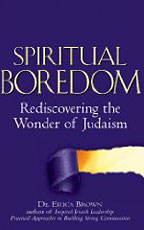"Once given the language of boredom, we have the challenge of using it correctly. Just as the word depression has been thrown into common parlance and its meaning has been lightened in certain contexts, so it is with boredom. When we offer a crisp personal definition of religious boredom, our diagnosis leads us with greater speed to healing. Or it can lead us to a more pervasive understanding of crisis. Boredom will not be solved by finding something to do.
"The fight against boredom is constant, as is well summarized in the following statement from Rabbi Israel Salanter (1810-83), one of the outstanding scholars of the Musar movement . . . : 'Man may be compared to a bird. It is within the power of the bird to ascend ever higher on condition that it continues to flap its wings without cessation. Should it stop flapping for a moment, it would fall into the abyss. So it is with man.'
"Maybe we want to be bored because it excuses us from the responsibility of generating wonder and activity, stirring curiosity, and developing within, of flapping our wings. Development involves change, and all change involves resistance. It is not hard to believe that boredom and its concomitant state of unhappiness are not actually closet desideratum that we pretend to fight. Perhaps we actually find boredom a perfectly acceptable state of existence. Philosopher Alain de Botton argues:
" 'There are few things humans are more dedicated to than unhappiness. Had we been placed on earth by a malign creator for the exclusive purpose of suffering, we would have good reason to congratulate ourselves on our enthusiastic response to the task. Reasons to be inconsolable abound: the frailty of our bodies, the fickleness of love, the insincerities of social life, the compromises of friendship, the deadening effects of habit. In the face of such persistent ills, we might naturally expect that no event would be awaited with greater anticipation than the moment of our extinction.'
"Were we to actually internalize the fact that we only have this life in which to engage the world, we might fight the 'deadening effects of habit' and dare to tease the boredom out of each day with a challenge to the senses and the intellect. For, to quote yet again from that masterwork Pirkei Avot (Ethics of the Fathers) 1: 14, the ultimate statement about time's battle with boredom is actually a question: 'If not now, when?'
"What are we waiting for? We have analyzed the deadening impact of boredom on the Jewish soul. We have picked apart its corrosive rusting of verve in the synagogue, the boardroom, the classroom. It follows us like a lethal shadow into our offices and slips into our bedrooms and even visits us on vacation. We have come to accept it as a fact of life, and we believe that when children experience it, all the better, since it will prepare them for an adult life of tedium. We must all carry its weight like an unwanted heavy sack at all stages of human development. We have come to realize that perhaps it is we who invited this unwelcome guest into our lives. Our lethargy and lack of receptivity. Our unresponsiveness and our lack of curiosity. Our cynicism and indifference helped boredom grow like a bacteria that only in its epidemic proportions do we begin to realize how it impoverishes our lives.
"But we will our boredom into existence because we may be afraid of a life that feels riskier, more thrilling, more filled with wonder. Rabbi Nachman . . . provides us with this reflection: 'Man is afraid of things that cannot harm him and he knows it; but in truth the one thing man is afraid of is within himself, and the one thing he craves is within himself.' "
